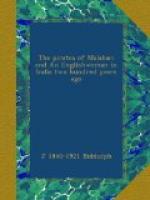War with France was being actively prosecuted by land and sea. In 1695 the nation was still smarting under reverses in the Low Countries and the repulse of the Brest expedition. At sea the navy was holding its own, though English commerce suffered terribly under the attacks of French corsairs of Dunkirk and St. Malo. The Company applied for a ship to be sent to the Indian seas to deal with the pirates; but Lord Orford, the head of the Admiralty, refused to spare one. It was the fashion for wealthy men to obtain letters of marque for privateering, and a syndicate was formed, to which the Chancellor, Lord Somers, Lord Orford, Lord Bellamont, and other Whig nobles were parties, to send out a privateer against French commerce. For this purpose the Adventure galley was purchased and fitted out, and the command was given to William Kidd, who was suggested to Lord Bellamont as a fit person for the task. Kidd was an old privateers-man who had gained some reputation in the West Indies during the war. Lord Bellamont had been appointed Governor of New York, though he did not proceed there till two years later. The king had charged him to use his utmost endeavours to put a check on the pirates who sailed from New England, and nothing better occurred to him than to obtain a commission for Kidd to act against the rovers. A general reward of L50 was offered for the apprehension of each pirate, and L100 for Every, increased in the following year to L500.
In December, a commission under the Admiralty Seal was issued to Kidd, authorizing him to proceed against French shipping. He was to keep a journal of his proceedings, and any ship captured was to be carried into the nearest port and legally adjudged by a competent court. If condemned, he might dispose of it according to custom. Six weeks later, a second commission under the Great Seal was granted him, in his capacity of a private man of war, to apprehend all pirates, freebooters, and sea rovers, the names of Thomas Too (? Tew), John Ireland, Thomas Wake, and William Maze, or Mace, being specially mentioned. Again, he was enjoined to keep an exact journal of his doings, and the pirate ships he captured were to be proceeded against according to law, in the same manner as French captures. A subsequent warrant was granted to the syndicate, who figure in it as the Earl of Bellamont, Edmund Harrison, William Rowley, George Watson, Thomas Reynolds, and Samuel Newton. Under these unpretentious names were hidden Lords Orford and Somers, and other Whig nobles. They were to account for all goods and valuables captured in the rovers’ possession: one-tenth was to be reserved for the Crown, the rest being assigned to them to recoup their expenditure.




